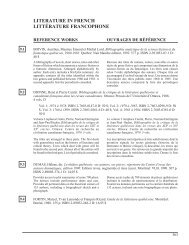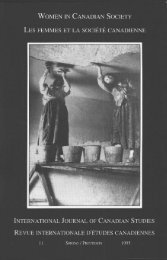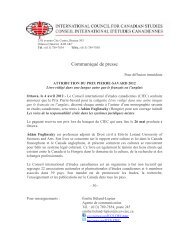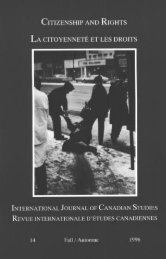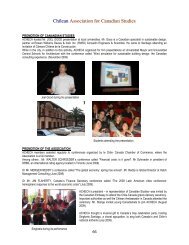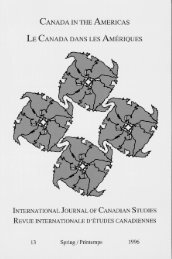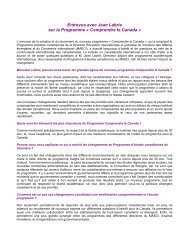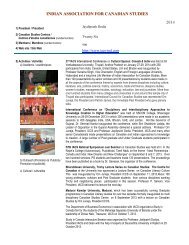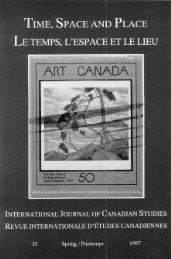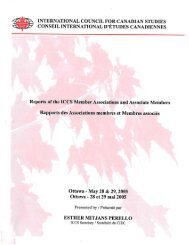Roshan G. ShahaniIn Quest of a Habitation <strong>and</strong> a Name:Immigrant Voices <strong>from</strong> India 1AbstractThis article explores some of the major thematic concerns of South Asianimmigrant writ<strong>in</strong>g <strong>in</strong> the Canadian context. It exam<strong>in</strong>es the immigrant writers’need to “journey” home not merely to satisfy a nostalgic impulse but torec<strong>la</strong>im the past <strong>and</strong> to create a collective history <strong>and</strong> myth of their peoples.Often, the immigrant writer writes as the “Other”, alienated by cultural <strong>and</strong>racial differences. This results <strong>in</strong> a “resist<strong>in</strong>g”, “fight<strong>in</strong>g” literature, creat<strong>in</strong>ga disturb<strong>in</strong>g impact on the comfortable conformity of the canon.RésuméC<strong>et</strong> article explore les pr<strong>in</strong>cipaux thèmes qui traversent les écrits desimmigrants de l’Asie du Sud <strong>in</strong>stallés au <strong>Canada</strong>. Il scrute le beso<strong>in</strong> de cesécriva<strong>in</strong>s de « revisiter » leur pays non pas tellement pour répondre à un appelnostalgique, mais pour récupérer l’histoire <strong>et</strong> les mythes de leurs peuples.Souvent, ces auteurs s’expriment en tant qu’« Autre », aliénés qu’ils se sententpar les différences culturelles <strong>et</strong> raciales. Ce<strong>la</strong> donne naissance à unelittérature de « résistance » <strong>et</strong> de « combat » qui perturbe sérieusement <strong>la</strong>rassurante conformité aux normes.The narrator of Shame, Salman Rushdie’s quixotic novel, muses thus: “What isthe best th<strong>in</strong>g about migrant peoples...? I th<strong>in</strong>k it is their hopefulness ... Andwhat’s the worst th<strong>in</strong>g? It is the empt<strong>in</strong>ess of one’s luggage ... We have comeunstuck <strong>from</strong> more than l<strong>and</strong>. We have floated upwards <strong>from</strong> history, <strong>from</strong>memory, <strong>from</strong> Time” (Shame, 87) 2 .Paradoxically, however, it is exactly this sense of disp<strong>la</strong>cement, this float<strong>in</strong>gupwards, which compels emigrants to look homewards <strong>in</strong> the midst of theirexiled state. The very words “exile,” “emigrant,” “expatriate” are, as a criticremarks, “sad prefixes that conjure up states of exclusion.” However, theexclud<strong>in</strong>g “e” has its antonymous companion—“<strong>in</strong>”, as <strong>in</strong> immigrant or<strong>in</strong>clusion (16). 3 Thus, emigrants/immigrants occupy a borderl<strong>and</strong> country,which provides them with a double vision, often propell<strong>in</strong>g them <strong>in</strong>to the act ofwrit<strong>in</strong>g. The impulse to take the literary journey home towards “history,”towards “memory,” towards “time,” is a result of the migrant’s long journeyaway <strong>from</strong> home. A case <strong>in</strong> po<strong>in</strong>t is Roh<strong>in</strong>ton Mistry, who confessed he had no<strong>in</strong>tention of becom<strong>in</strong>g a writer until he emigrated to Toronto. 4International Journal of Canadian Studies / Revue <strong>in</strong>ternationale d’études canadiennes6, Fall/Automne 1992
IJCS/RIÉCThe imperative need to journey home arises <strong>in</strong> part <strong>from</strong> the nostalgia that thediaspora cannot help but feel for the country left beh<strong>in</strong>d. The need to be Indian<strong>and</strong> feel Indian seems to grow <strong>in</strong> <strong>in</strong>verse proportion to the distance one travelsaway <strong>from</strong> India <strong>and</strong> Indians. The writ<strong>in</strong>g process assuages the homesicknesswhich is so much a part of the exiled psyche; occasionally, it provides theWestern reader with a k<strong>in</strong>d of exotica. Often, s<strong>in</strong>ce the remembered past isabout the author’s grow<strong>in</strong>g-up years, his writ<strong>in</strong>g might conjure up a world thathas long s<strong>in</strong>ce ceased to exist. The reader is fed on what Uma Parameswarancalls “monstrous meat,” the “fabled splendour of an idealised homel<strong>and</strong>”(85) 5 . To an extent, this happens <strong>in</strong> Runn<strong>in</strong>g <strong>in</strong> the Family 6 , where MichaelOndaajte’s delightful trac<strong>in</strong>g of his Sri Lankan ancestry <strong>in</strong>cludes overtones oforiental lushness.A more serious consideration, however, apart <strong>from</strong> nostalgic rem<strong>in</strong>iscence,can also be perceived <strong>in</strong> the immigrant writers’ act of recreat<strong>in</strong>g the past. Theythus become folk-historians, myth-makers, preservers of the collective historyof their peoples. In many <strong>in</strong>stances, as M.G. Vassanji states: “this rec<strong>la</strong>mationof the past is the first serious act of writ<strong>in</strong>g. Hav<strong>in</strong>g rec<strong>la</strong>imed it, hav<strong>in</strong>g givenhimself a history, he liberates himself to write about the present” (66). 7 Thepast, therefore, becomes the writers’ physical as well as spiritual raison d’être,especially <strong>in</strong> their first novel. Bharati Mukherjee’s The Tiger’s Daughter, 8Mistry’s Such a Long Journey 9 <strong>and</strong> Vassanji’s The Gunnysack 10 are but a fewexamples.Mukherjee’s The Tiger’s Daughter has fictionalized the immigrant’s uneasyencounter with her home country; the protagonist, Tara, belongs to a no-man’sl<strong>and</strong>, for she can re<strong>la</strong>te neither to the new, unfamiliar Calcutta of work<strong>in</strong>g c<strong>la</strong>ssunrest, nor to her own Brahm<strong>in</strong>ical, aristocratic background; New York, whereshe now resides, is the site of violence <strong>and</strong> racism, <strong>and</strong> where she, the formerprivileged Indian, now becomes the ostracized victim. The novel offers no neatsolutions <strong>and</strong> reflects Mukherjee’s own divided universe. It might have helpedher, however, “shed her sickness” through the <strong>in</strong>itial act of writ<strong>in</strong>g. The ThirdWorld writer needs “to till his own soil as first step” 11 (168). This is furtherperceived <strong>in</strong> the sentimental journey that Roh<strong>in</strong>ton Mistry undertakes <strong>in</strong> hisfirst novel, Such a Long Journey. Through the narrative, Mistry recreates theIndia of the seventies, fus<strong>in</strong>g the familial with the political, the personal withthe historical. His writ<strong>in</strong>g, furthermore, br<strong>in</strong>gs <strong>in</strong>to focus the m<strong>in</strong>uscule Parsicommunity of Bombay, an <strong>et</strong>hnic <strong>and</strong> religious m<strong>in</strong>ority. Possibly, Mistry’speculiar situation of formerly belong<strong>in</strong>g, to a m<strong>in</strong>ority with<strong>in</strong> India’sma<strong>in</strong>stream <strong>and</strong> currently belong<strong>in</strong>g to a m<strong>in</strong>ority with<strong>in</strong> a m<strong>in</strong>ority <strong>in</strong> <strong>Canada</strong>,helps him recover a sense of self. Recall<strong>in</strong>g the experiences of a m<strong>in</strong>oritycommunity which is culturally marg<strong>in</strong>alized <strong>in</strong> India <strong>and</strong> helps himacknowledge his situation as a still more marg<strong>in</strong>alized figure <strong>in</strong> the Canadiancontext. However, it is not so much <strong>in</strong> this novel as <strong>in</strong> a much earlier shortstory, “Lend Me Your Light,” (Tales <strong>from</strong> Firozsha Baag), 12 that Mistry, <strong>in</strong>the guise of his persona, the immigrant Kersi, r<strong>et</strong>urns on a brief visit. Indiaappears to him “brown, weary, unhappy.” Nor has <strong>Canada</strong> turned out to be the88



